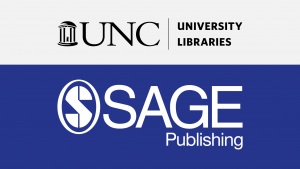Category: Uncategorized
Upcoming Elsevier cancellations
A message from Provost Bob Blouin and University Librarian Elaine Westbrooks
Dear members of the Carolina community,
We are writing to let you know that, despite more than a year of sustained negotiations, the publisher Elsevier has failed to provide an affordable path for UNC-Chapel Hill to renew our bundled package of approximately 2,000 e-journal titles. As a result, we will not renew this package when it expires on April 30, 2020. Instead, the University Libraries will subscribe to a much smaller set of individual Elsevier titles.
You can find the new list of subscribed titles online at https://library.unc.edu/collections/elsevier-subscribed-titles.
Background
For two decades, Carolina has licensed a large package of e-journal titles from Elsevier. During this time, subscription costs have increased steadily. Extending our current license would now cost $2.6 million annually, a price that is unaffordable and unsustainable.
This problem is not unique to Carolina. Last year, the University of California system terminated its Elsevier subscriptions entirely after failing to reach a satisfactory agreement. Other leading universities worldwide have greatly reduced their Elsevier subscriptions.
In 2019, the University Libraries launched the Sustainable Scholarship initiative to share information with the University community about the growing cost of scholarly information and about Carolina’s commitment to affordability, sustainability, transparency and open access.
This spring, the University Libraries launched a campus survey to solicit important information about researcher use of Elsevier titles. That information, along with data about actual use, costs and other factors, has informed the decisions about which titles to retain.
Going forward
The University Libraries is committed to providing you access to Elsevier content through both new and existing channels. All members of the Carolina community may use the following services at no charge:
- 24-hour document delivery via Interlibrary Loan – The University Libraries’ ILL service will provide access to journal articles within 24 hours, delivered directly to your email.
- Two- to four- hour expedited document delivery service – For faculty and graduate students who need faster access, the Libraries has implemented an expedited delivery service that will freely deliver articles in two to four hours, even outside of business hours.
Visit https://web.lib.unc.edu/carolinablu/ (or https://illiad.lib.unc.edu/NOH/ for Health Affairs affiliates) to learn more.
As we transition to these new ways of providing access to Elsevier titles, we wish to ensure that faculty and students at Carolina have the resources they need. We welcome your feedback at journalfeedback@unc.edu.
Please note that this subscription decision does not limit your ability to publish, edit or peer review for Elsevier or any other publisher. However, if you are interested in helping to curb the cost of scholarly publication, we invite you to learn about ways that you can take action.
We would like to thank the staff of the University Libraries, the Administrative Board of the Library, Faculty Council and all those who have helped us reach this important decision on behalf of Carolina.
Sincerely,
Bob Blouin
Executive Vice Chancellor & Provost
Elaine L. Westbrooks
Vice Provost for University Libraries & University Librarian
Sustainable scholarship discussions in January and February 2020
Please join representatives from the University Libraries for a conversation about the cost of scholarly information and the implications for the University of North Carolina at Chapel Hill.
RSVP requested:
- Tuesday, January 21, 2020 – 10:00 a.m. – 11:30 a.m. in 214 Davis Library
- Tuesday, February 11, 2020 – 10:00 a.m. – 11:30 a.m. in 215 Health Sciences Library
- Wednesday, February 19, 2020 – 2:00 p.m. – 3:30 p.m. in 214 Davis Library
- Thursday February 20, 2020 – 2:00 p.m. – 3:30 p.m. in 215 Health Sciences Library
In February 2019, the University of California cancelled its contract with Elsevier due to unacceptable license terms and subscription costs. Elsevier is the world’s largest publisher of scholarly journals. The terms by which it sells content to universities have become unsustainable for most institutions, including Carolina, which is currently in negotiation with Elsevier.
This conversation will provide an opportunity for library administrators to share information about the costs of scholarly information at UNC-Chapel Hill and to hear from members of the Carolina community about needs, questions and concerns.
Suggested background reading:
- Update on Elsevier negotiations from University Librarian Elaine Westbrooks
- The Real Cost of Knowledge (The Atlantic, March 4, 2019)
- Unsustainable Scholarship: How Private Companies Control Research in Higher Education (DTH, September 18, 2019)
- University Librarian Elaine Westbrooks is on a mission to open Carolina’s research to all (The Well, October 11, 2019)
- UNC Faculty Council Resolution 2019-8, “On Containing the Costs of Published Research”
Sustainable scholarship discussions on Oct. 31, Nov. 6 and Nov. 12
Earlier this year, the University of California cancelled its contract with Elsevier, the world’s largest publisher of scholarly journals, due to unacceptable license terms and subscription costs. Carolina’s University Libraries is now in renewal negotiations with Elsevier, seeking an affordable and sustainable agreement that is consistent with both Faculty Council Resolution 2019-8, “On Containing the Costs of Published Research,” and the University’s open access policy.
Learn more about these issues at one of three Library-sponsored town halls (RSVP requested):
- Thursday, October 31. 9 am. – 11 a.m. 214 Davis Library. RSVP
- Wednesday, November 6. 11:30 a.m. – 1:30 p.m. 214 Davis Library. RSVP
- Tuesday, November 12. Noon – 2 p.m. 214 Davis Library. RSVP
Suggested background reading:
- Statement from University Librarian Elaine Westbrooks on the UC System’s Termination of Elsevier Subscriptions
- The Real Cost of Knowledge (The Atlantic, March 4, 2019)
- UNC Faculty Council Resolution 2019-8, “On Containing the Costs of Published Research”
- Unsustainable Scholarship: How Private Companies Control Research in Higher Education (DTH, September 18, 2019)
- University Librarian Elaine Westbrooks is on a mission to open Carolina’s research to all (The Well, October 11, 2019)
UNC-Chapel Hill Libraries to debut open access pilot with SAGE Publishing
The University Libraries and SAGE Publishing will enter into a pilot agreement enabling researchers at the University of North Carolina at Chapel Hill to publish open access articles in SAGE journals at no cost to the researcher.
Under the agreement, part of the subscription fees that the Library will pay for SAGE content beginning in 2020 will cover the costs of open access publishing for a number of UNC-Chapel Hill authors in SAGE publications. This comes at no additional cost to the Library and will preserve access to all content that the Library currently licenses from SAGE.
“We want to make it as easy as possible for Carolina researchers to publish open access,” said Elaine L. Westbrooks, vice provost for University Libraries and University librarian. “This is also part of our strategy to forge new channels that will make published research as open and accessible as possible.”
SPARC, a coalition that promotes open access publishing, defines open access as “the free, immediate, online availability of research articles coupled with the rights to use these articles fully in the digital environment.” Such uses include reading, downloading, linking, searching, printing and citing.
Articles covered by this agreement will be fully open and will also undergo the same peer review and editing process as other scholarly articles from SAGE.
“Researchers write to be read,” said Westbrooks. “At Carolina, we have scholars doing amazing work that can change the world and better the human condition. When they publish open access, they reach the broadest possible audience and have the greatest impact.”
Westbrooks said she is especially interested in supporting junior faculty members and graduate students — the emerging researchers for whom open access charges are often out of reach.
The pilot agreement will also allow Carolina-affiliated SAGE authors to deposit copies of their articles in the Carolina Digital Repository. The repository is an open access home that the Library operates to preserve and share work produced at the University.
“For a public university committed to advancing knowledge and bettering the human condition, promoting open access is core to our values” said Westbrooks. “Making more work open is the right thing to do.”
When public scholarship hits the paywall
By Elaine Westbrooks, Vice Provost for University Libraries and University Librarian at the University of North Carolina at Chapel Hill

As the nation’s first public university, Carolina’s tradition of public service is woven into the very fabric of the University. I am proud to serve an institution that proudly declares itself to be “of the public and for the public.” I see that commitment play out every single day as I interact with scholars who are committed to bettering the lives of North Carolinians and to making discoveries that will change the world.
So, it is ironic that many of these scholars are locked into a publishing ecosystem that is about as far as one can get from serving the public good. This is the case not only at Carolina but at every major research institution in the country.
To understand why this is so, let’s look at what is known as the “scholarly publishing cycle.” As we saw in my last post, publishing in scholarly journals to which libraries subscribe is the way that scholars share knowledge with one another—and have done so for hundreds of years.
In addition to conducting the research itself, faculty members volunteer their labor as journal editors, editorial board members, and peer reviewers. They do this not only to advance knowledge, but also because an entire system of academic advancement and tenure grew up around the idea that faculty ought to publish their findings and should provide the services of editing and peer review that make it possible for other faculty members also to publish this way.
When scholars and scholarly societies produced their own journals, this process made sense. But as large for-profit publishers stepped into the equation as the primary purveyors of academic journals, the costs and the benefits have fallen out of balance.
To put it plainly, private publishers are leaning on taxpayers and universities to foot the bill for research and for the cost of its publication. Yet, if you are a member of the taxpaying public, much of this original research will be unavailable to you, hidden behind subscription paywalls.
The only entity in all of this to turn a profit is the publisher—and those profits can be significant. The world’s largest publisher of scientific information is Elsevier. In 2018, Elsevier’s parent company, RELX, posted revenues of U.S. $9.8 billion, of which around 40% came from Elsevier. Carolina’s contribution to that total was nearly $2.5 million in subscription fees.
As publishing has consolidated, fewer and fewer publishers serve as the gateway to the world’s research production. In fact, by 2013, just five publishers had come to control more than 50% of all academic published output. That’s a situation that’s never good for the consumer, in any industry.
As a public institution so deeply committed to the public good and the betterment of all North Carolinians, I believe UNC-Chapel Hill has a special responsibility to raise awareness about the cost of research publications, and to turn the tide in favor of creative solutions that make information more affordable, sustainable, open, and transparent.
